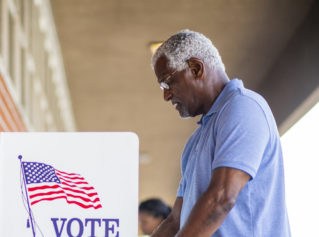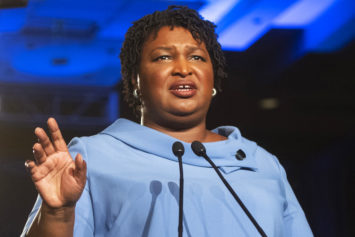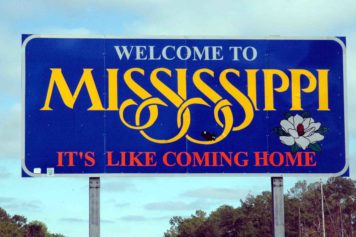“All politics is local” – Thomas “Tip” O’Neill, Speaker of the House, 1977-1987
On Tuesday, November 7, across the country there will be elections that will decide the quality of daily life for many Americans. Unfortunately, most people will not vote. Although everyone should participate in these important elections, African-Americans, who have much to lose if local elections are not decided favorably, should be particularly motivated to go to the polls.
Voter turnout is a serious issue in America. According to political expert Dr. Larry J. Sabato, voter participation in presidential election years (e.g., 2008, 2012, 2016) is usually between 50 and 60 percent. However, the same report indicates that it is rare for more than 40 percent of Americans to vote in Congressional midterm election years (e.g., 2006, 2010, 2014). In state and local elections in odd-numbered years, such as 2017, turnout can be lower than ten percent.
The turnout issue has a racial dimension as well. It is well known that the electorate that votes in off-year elections is generally “older, whiter, and more Republican” than the group that votes in presidential elections. Although data on the racial gap in local elections is sparse, Sabato’s data shows that the gap between white and non-white participation in congressional midterm elections can be as much as 30 percentage points.
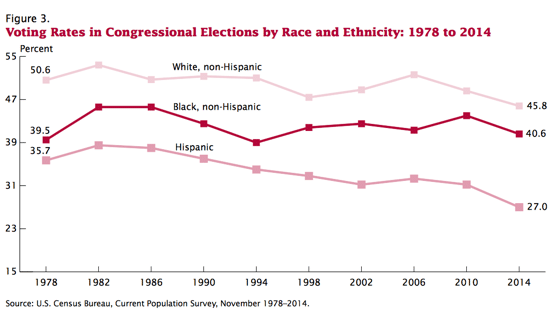
This graphic from the Huffington Post depicts the gap between Black and white voters in midterm elections.
Source: https://www.huffingtonpost.com/2015/07/17/low-voter-turnout-in-2014_n_7817052.html
This gap in voter participation matters to all Americans but has a special significance for African-Americans for three reasons.
The first reason is political representation. Demos, a public policy organization that studies political inequalities, examined 438 municipalities that, demographically, would be expected to have at least one Black representative in the city government. Of the 438 cities, they found that 175 had councils that underrepresented the African-American population. Some of the cities had Black populations as high as 77 percent, yet not a single Black representative on the city council. Although the presence of Black elected officials will not magically solve difficult issues, their absence can create problems for African-American residents if the remaining officials are not responsive to their needs and concerns, racial or otherwise.
Second, voter turnout may be related to the distribution of resources. A recent study found that high turnout in local elections can influence the spending decisions of elected officials. This result followed regardless of the racial make-up of the governing body. The authors stated, “This implies that if more racial and ethnic minorities and members of other disadvantaged groups do turn out to vote, they may be able to pressure governments into spending on policies that are more in line with their preferences.”
Finally, and most significantly, although the federal government gets the lion’s share of the media attention, many of the issues that make lives more challenging for Black people are decided at the local level. Over 80 percent of African-Americans believe that police brutality is a serious issue. The sheriffs that manage the police, the prosecutors that are responsible for challenging police misconduct, and the judges that hear the cases against the police are often elected or appointed by elected officials.
African-Americans are largely dissatisfied with the public schools that their children attend. Schools are controlled by locally elected school boards. African-Americans are more likely than other Americans to want neighborhoods that are walkable and have convenient shopping and public transportation. The decision to allow both residential and commercial uses in a neighborhood is up to the local zoning board. Public transit is similarly governed by local authorities.
Two recent national news headlines highlight the importance of local officials in Black lives. African-Americans across the nation were outraged after Michael Brown was killed by a police officer in Ferguson, Missouri, in 2014. Although Ferguson is a majority-Black city, the mayor and five of the six city council members were white. Although African-Americans in Ferguson turned out for presidential elections at the same rate as their white counterparts, local elections in Ferguson are held in the spring of odd-numbered years. As a result, African-American turnout dipped sharply in the local elections. In April 2017, the same white mayor that served as mayor during the Mike Brown incident was re-elected in an election with dismal turnout — less than 5 percent of the eligible voters. Although there were no reports of voter suppression, based on the research, the timing of the election likely played a role.
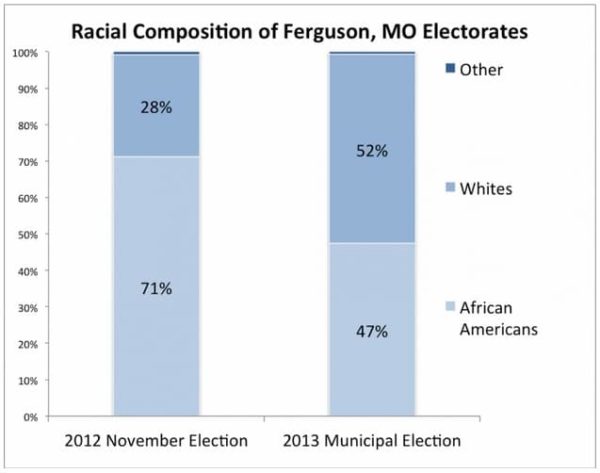
This graphic explains the differences in voter turnout in Ferguson.
Source: Washington Post, https://www.washingtonpost.com/news/monkey-cage/wp/2014/08/15/how-ferguson-exposes-the-racial-bias-in-local-elections/
Another Midwestern city, Flint, Michigan, provides a second example of the importance of local and state elections. In 2014, news reports from Flint indicated that the drinking water was unsafe for drinking, bathing, or other normal purposes. Although the in-fighting about exactly who is responsible for the water crisis continues to this day, one thing is clear: A Republican state governor appointed an emergency manager for the city. That manager, a state employee, encouraged the mayor of Flint and other city officials to switch their water source. That fateful choice caused the people of Flint to live with contaminated water. That choice was not made by the federal government, but by state and local officials.
Clearly, local elections matter to the Black community. The importance of local elections does not mean that federal elections are not also important. In our system of government, citizens must answer to local, state, and federal authorities. (Consider the fact that in many places people pay federal, state, and local taxes.) Local governments take the lead in many issues. But there are some areas of shared or overlapping responsibility. Also, even where authority is not shared, the federal government’s actions can help or hinder local actors.
Although the problems in Ferguson were caused by local officials and employees, federal intervention helped provide a remedy. Department of Justice officials appointed by President Obama filed suit against Ferguson to force policing reforms. The suit ended with a consent decree wherein Ferguson officials agreed to enact reforms such as anti-bias training and community engagement.
Similarly, the federal government reacted positively to the crisis in Flint. President Obama declared an emergency, which allowed the Federal Emergency Management Authority (FEMA) to provide assistance. He also directed federal agencies to provide additional funds for educational, medical, and nutritional assistance for Flint residents impacted by the water crisis.
Federal government can attempt to make things better locally, but the converse is also true. At times, local actors can block beneficial federal programs. The Medicaid expansion issue is a prime example. The Supreme Court held that the Affordable Care Act (“Obamacare”) could not require states to expand Medicaid; rather, the states had to be allowed to choose to do so. Most of the states that continue the fight against Medicaid expansion are led by Republicans. Medicaid expansion is but one example of how the person in the state house may matter more than the person in the White House.
Local elections give African-American citizens the chance to elect officials who will respond to the issues that are important to them. Some of the issues are literally matters of life and death. Others simply affect one’s quality of life. No matter the issue, when it comes to local elections, Black votes certainly matter.
